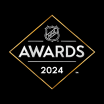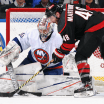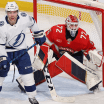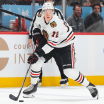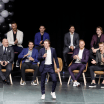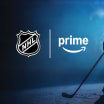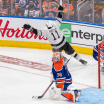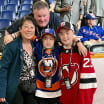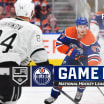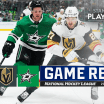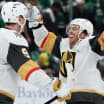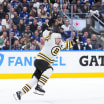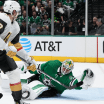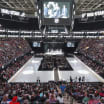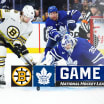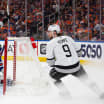Here we are once again, on the cusp of another hockey season, another hockey season in which the Washington Capitals are expected to be one of the upper echelon teams in the National Hockey League. Most Octobers over the last decade, you could look at the Capitals on paper and proclaim them a team with a chance to hoist Lord Stanley's coveted Cup the following June.
Caps Set to Pursue Cup Again
Each of Washington's last two teams were good enough to win the Cup, but they fell ultimately short. Will the third time be the charm?
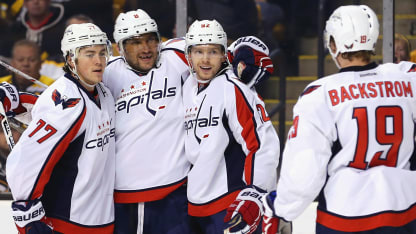
© Maddie Meyer
The hoisting hasn't happened yet, but as they prepare to start the '16-17 regular season against the defending Cup champion Penguins in Pittsburgh on Thursday, the Caps enter the regular season as probably one of the five or six best teams in the league and a team with a chance to win next June. It's not unfamiliar territory at all, but this year's model is a fair shot better than the team the Caps iced the last time they opened against the defending champs.
Just over three years ago, the Washington Capitals started the 2013-14 season against the then-defending Stanley Cup champion Chicago Blackhawks in the Windy City, dropping a 6-4 decision to the Hawks despite a hat trick from Mikhail Grabovski in his first game in a Capitals sweater.
With the benefit of hindsight, we can now see 2013-14 as the nadir of Washington hockey over the last decade. The '13-14 bunch is the only Caps team since 2006-07 - Alex Ovechkin's sophomore season in the league - to miss out on the Stanley Cup playoffs entirely. We can also see that the Caps' rebound from that low point has been fairly swift and impressive, even if it hasn't yet delivered the ultimate prize.
Three of the players in Washington's opening night lineup on Oct. 1, 2013 were rookies playing in their first regular season games in the league. Two of those players - Connor Carrick and Tom Wilson - were teenagers. Here's how the Caps' lineup looked three short years ago at this time.
FORWARDS
Johansson-Backstrom-Ovechkin
Laich-Grabovski-Brouwer
Chimera-Fehr-Ward
Erat-Latta-Wilson
Scratches: Beagle, Volpatti
DEFENSE
Alzner-Carlson
Erskine-Green
Hillen-Carrick
Scratch: Oleksy
GOALTENDERS
Holtby
Neuvirth
As the Caps prepare to embark upon their 2016-17 regular season voyage, only eight of those 23 players remain in Washington: Alzner, Backstrom, Beagle, Carlson, Holtby, Johansson, Ovechkin and Wilson. And 14 of the 22 rostered players are former first round NHL draft choices. Here's how the Caps' opening night roster shakes out for Thursday's game in Pittsburgh:
FORWARDS
Ovechkin-Kuznetsov-Oshie
Burakovsky-Backstrom-Johansson
Sanford-Eller-Williams
Winnik-Beagle-Wilson
Connolly
DEFENSEMEN
Orlov-Carlson
Alzner-Niskanen
Orpik-Schmidt
Chorney
GOALTENDERS
Holtby
Grubauer
Sixteen more players - including Grubauer, Kuznetsov, Orlov and Schmidt - joined the Caps later on in that '13-14 season. Aside from the aforementioned quartet, just one of those other 16 players (Islanders goalie Jaroslav Halak) is on an NHL opening night roster this season, which speaks a bit to the depth - or lack thereof - of that ill-fated '13-14 team.
There was very little in the cupboard at AHL Hershey that season, either. The Bears also missed the playoffs, and Washington-drafted players accounted for an abysmal total of just 11 of 214 (5.1%) Hershey goals during the 2013-14 regular season, led by three each from Orlov and Stanislav Galiev. With nine points (nine!), Orlov was the Hershey scoring leader among Washington-drafted players for the Bears that season.
The Caps were never able to string together as many as four consecutive wins at any point in 2013-14. Washington finished with 90 points, three points south of the final playoff berth. For the only time in their current 11-season affiliation, the Caps and Bears both missed the playoffs in their respective leagues. The Capitals finished the season ranked 21st in the league in goals against and 27th in shots against.
That messy 2013-14 season resulted in the dismissal of general manager George McPhee and coach Adam Oates; Brian MacLellan and Barry Trotz, respectively, were named as their replacements in May of 2014. Those twin hires ushered in a new era of Capitals hockey, as the tandem of MacLellan and Trotz were able to turn the ship around and return the team to contender status quicker than most would have believed possible at the time.
MacLellan went right to work on improving the team's defense - signing Brooks Orpik and Matt Niskanen to long-term deals in the unrestricted free agent market. Trotz assembled a wise and experienced coaching staff, and set about changing the culture of the team.
The team's goaltending was in disarray after a puzzling and dysfunctional portion of the '13-14 season during which the team inexplicably carried three goaltenders for more than a month, and then traded for another one (Halak) at the trade deadline. Bringing goalie coach Mitch Korn into the fold and anointing Braden Holtby as the undisputed No. 1 guy in net solved that problem, but the improvement of the personnel and the changing of the culture were also critical in the team's quick turnaround.
"The biggest difference is we've changed the culture around," says Holtby. "Obviously that's a credit to the management and coaching staff, number one, changing how we perceive success in the locker room and how we go about accomplishing it. That's obviously the biggest thing.
"And then the personnel changes we've had the last two years, you can't discount those. Getting Orpik and Niskanen that first summer with new management changed the whole feeling of the team. Having those two guys back there - not only for their playing style, but their leadership - and then the next summer going out and getting Osh and Justin Williams made all the difference. Two more guys who are outstanding in the locker room and love competing. It's contagious in our locker room with those four guys and what they do. It's been a lot of different things and it's changed a lot in just a couple of years."
"I feel like we are a totally different team with a different mindset," says Caps center Nicklas Backstrom, another of the eight holdovers from 2013-14. "I feel like that changed after we changed the coaching staff and the GM. It was a makeover for the whole team. It's a different mindset, that's for sure, and we've got a different attitude and we're better as a team."
In each of the two seasons since the playoff miss, the Caps have managed double-digit improvements in their point totals. After a sluggish start in 2014-15, the Capitals finished with 101 points before bowing out of the playoffs in a seven-game, second-round series with the New York Rangers. Last season, the Caps rolled up 120 points and earned the Presidents' Trophy as the league's best regular season team. But they suffered the same postseason fate, a second-round exit at the hands of the eventual Stanley Cup champion Pittsburgh Penguins.
After the '14-15 postseason exit, MacLellan identified the right side of his top two lines as the next area of weakness to address. He signed three-time Stanley Cup champion Justin Williams as a free agent, and acquired T.J. Oshie from St. Louis in a trade a day later.
In the wake of last spring's disappointing early exit from the playoffs, MacLellan was once again asked for his assessment of where his team fell short.
"I think what was a well rounded, deep forward group became less of that in the playoffs," said MacLellan. "The production from second- and third-line players just wasn't there the way we anticipated that it would be. The level of play - that was a high level. And there was some drop-off in our guys. They didn't get it done at that level. Could we have anticipated it? I'm not sure I would have anticipated our young guys on the second line not producing a little bit more. And that's all we needed was a little bit more. And we needed a little bit more out of our third-line guys, which we didn't get.
"For me, we have to continue to develop our young guys like [Evgeny] Kuznetsov and [Andre] Burakovsky. They're both going to get better. And our third line I think probably needs a little work. We're going to have to have a better top nine. That would be the major focus area for me.
"To me we've got a top seven and maybe a top eight, and we need to fill out eight and nine. At the third line center spot, Beags did a good job for a while and Johansson did a good job for a while. But I'd like to get it a little more solid, the whole third line. You need offense and defense from your whole third line, as we learned in that last series."
During his time on the job, MacLellan has shown a level of candor his peers rarely display. He has not been shy in identifying the weaknesses of his team to the media at the conclusion of each season, and he has set out to address those weaknesses each summer.
The Caps were the league's second best team even-strength scoring during the 2015-16 regular season. But they were second worst in the NHL in that same category during the 2016 Stanley Cup playoffs. Washington's goaltending has been of Cup-winning caliber in each of the last two springs. It's the scoring depth - or lack thereof - that has let the Caps down in the postseason. It's not a stretch to say Washington has wasted some Cup-caliber goaltending these last two springs.
With all of that in mind, MacLellan acquired 27-year-old center Lars Eller in a draft day trade with Montreal this past summer. He signed 24-year-old winger Brett Connolly as a free agent. Those two additions were made to offset Washington's only significant offseason loss - that of veteran left wing Jason Chimera to free agency - and to augment the Capitals' third line and the team's secondary scoring.
Eller has been excellent in training camp and the preseason. Connolly has played well enough, but rookie Zach Sanford had a better camp and preseason, earning a spot on the third line alongside Eller.
As good as the Capitals were last season - and they were very, very good - this year's model might be even better. Only two players (Orpik and Williams) are over the age of 31; the Caps enter the season as the league's 13th oldest team. Much of the roster is quite youthful and can still reasonably be expected to show improvement, especially under the tutelage of the team's top-notch and in-demand coaching staff. Associate coach Todd Reirden was a finalist for Calgary's head coaching vacancy last summer, and assistant coach Lane Lambert was a finalist for the same post in Colorado.
"I think so," responds Holtby, when asked if he believes the '16-17 Caps are better than last season's group. "I think at the end of the year it's going to be better. Just the depth we have, finding a guy like [rookie] Zach [Sanford] to come in. With his poise with the puck, he can be a big part of our team.
"You never know statistically what we're going to end up at because in the regular season, things went right for us in a lot of situations last year, and luck plays a part in things like that. But I believe we can still push for the conference and go from there."
The 2016-17 Capitals will be hard-pressed to improve upon last season's point total, let alone put forth a double-digit improvement for a third straight season. Washington's schedule is significantly more rugged this season in terms of miles traveled, sets of back-to-back games, and one-game road trips. And the Caps aren't sneaking up on any of their opponents, either. As one of the league's elite teams, they routinely inspire top efforts from the opposition.
"You go through even just a short bad stretch where you lose a couple of games and life at the rink isn't fun," observes Niskanen. "It's a lot more fun when everyone is putting in good work and good execution, and we find wins and you're learning lessons along the way while you're winning.
"So I think that's the approach that we're going to take, to have that same competitive nature that we had last season while also paying attention to how we're going to have to play at the end of the year, to just keep getting better and better."
Washington might have actually been "too good" in some regards last season. The Caps clinched their division, their conference and the Presidents' Trophy so early in the season, they were left with 10 or 12 more or less meaningless games between that juncture and the start of the playoffs. They suddenly found themselves in uncharted territory, with no road map to help them navigate their way through it. That rare problem seems unlikely to crop up again in 2016-17.
"I think we have to be patient with the fact that what we did last year as a group was still pretty special," Holtby says. "It just so happened that we didn't stay on the ball enough in the second half to keep pushing ourselves forward. Other teams had that automatic push forward with the playoffs races and stuff like that, that subconsciously pushes them into a better team and we needed to create something better than that because we didn't have that playoff push.
"At the same time, the last two seasons we've had teams that could have won the Stanley Cup. It's just so hard now with the other teams and the parity. We've got to stay focused now on what we're doing here because it is good and we are giving ourselves a great chance to win. If we keep believing in working hard, focusing on our group and growing ourselves, one of these days it will pay off."
"Preparation is key," says Orpik. "I think just trying to build momentum as the season goes and then trying to carry that from the regular season to the playoffs is probably the most important thing. Last year, we were kind of in a weird situation clinching as early as we did. Having a good chunk of games left before the playoffs I think might have hurt us a little bit. I think trying to learn how to approach those games the right way was probably a good learning experience for us.
"You just try to set yourself up, give yourself the best situation to succeed going into the playoffs. If you ask any guy who has been on a team that's won the Stanley Cup, I think every guy will tell you that you need a certain degree of luck along the way to win, whether it's calls or lucky bounces or what not. But it's a combination of a lot of things. You've just got to control what you can control, and ideally create a good amount of momentum going into the playoffs."
The pain from the early exits of the last two springs is still fresh enough to provide motivation for the 2016-17 Capitals, too.
"I think you learn as you go through the league - especially when you're playing on good teams that do have realistic chances of winning - every year that goes by is a lost opportunity," says Orpik, who was a member of the 2008-09 Stanley Cup champion team in Pittsburgh. "Every year, every guy in the room obviously gets a little bit older. You really don't get a lot of realistic chances in this league with how much player movement there is.
"You hear guys talk about it every year, with free agency you never do have the same group from year to year. That's disappointing, because I know the group we had really got along really well and we had a pretty good bond here. So it's disappointing, but we also realize that we lost to the team that was probably the best team in the league down the stretch and all four games we lost were by one goal, and two of them were in overtime.
"I'm sure guys have some regrets and obviously there were a lot of things that we could have done differently as a team and individually but I think it's encouraging and a little bit more frustrating at the same time, knowing that we were that evenly matched with the team that won the whole thing."
As if the Caps aren't motivated enough by the heartbreaks of the last two springs, nearly half the players on the opening night roster (10 of 22) will be playing out the final season of their respective contracts in 2016-17. Many of those players - including Alzner, Burakovsky, Kuznetsov, Orlov, Oshie and Williams - are key contributors, and all will certainly be seeking to put their best foot forward ahead of impending contract negotiations.
MacLellan and his hockey operations staff will also be monitoring the play of those 10 players, and they'll have quite the task figuring out which players to try to retain beyond this season, and how much salary cap room they'll have with which to do so.
"I think we'd like to play it out a little bit," says MacLellan. "Obviously the younger players will take priority, Kuznetsov being one of them. We've got to keep in mind the expansion draft and what's going to happen with that. We're going to lose a guy there. Which guy might we lose? There are a lot of variables that are going into it. We'll set a priority on certain guys and then go from there, try and work it out."
Like many of his players, MacLellan believes the '16-17 Caps are an improvement over the strong teams of the last two seasons.
"I honestly feel we're a better team," says MacLellan, "when you can improve your center ice position and our young guys are getting better. I really like our forward group. If we're healthy on the back end and Orlov improves and Schmitty improves, we should have a pretty good, well-rounded defense corps.
"With Holtby, I don't expect him to have a Vezina-type season, but I'd take it. But he is going to give us solid goaltending and Grubi is getting better. We're a better team than we were last year, on paper. It doesn't always translate to a Presidents' Trophy, and I don't know that we necessarily need to be that good during the regular season. We just need to be good during the playoffs. We want to get it to the next level. We want to win a championship."
That elusive championship. Nothing else matters. The Caps have won divisions and conferences and Presidents' Trophies. Those are all grand achievements, but not a single member of this team ever dreamed of winning a division or a conference or a Presidents' Trophy as a kid. The Stanley Cup is what matters, it's what childhood dreams are made of. Winning the Cup is the primary motivator of every player on every team, which is why playoff hockey is simultaneously so exhilarating and so heartbreaking.
After losing to the Rangers in the 2015 Stanley Cup playoffs, Trotz mentioned a lack of "killer instinct" as an element he believed was missing from his team. The Caps also seemed to lack a killer instinct at times last spring against the Penguins. After taking a 1-0 lead in the series against Pittsburgh, they lulled their way through the first 40 minutes of Game 2, and also failed to take advantage of a potential turning point of the series, losing Game 4 to Pittsburgh while top Pens defenseman Kris Letang was sitting out with a one-game suspension.
"You've got to take advantage of those opportunities you get during a series and we had opportunities to take advantage of them," laments MacLellan. "In the end, it's a one-goal series. And they just did it once or twice more than us."
"I think it's just something that comes from the personality of your team and your mindset," says Niskanen, when asked about the concept of killer instinct. "You can have all the reminders and talk about it in between, but when you're in that moment, it's something that you just have to develop as a group - individually and as a group.
"The way the league is, you can't take any moment for granted. And that's easier said that done. On paper, you just say, 'Well, just be focused all the time.' But you can't give that 'extra effort' that we talk about 100 percent of the time. It's not 'extra' effort anymore.
"I think it's just recognizing moments and then bearing down. I thought we got a lot better at that last year, as far as consistent will and determination throughout the year, I thought it was a fantastic improvement in that department. For us, it's going to come down to that determination to will yourself to win in those moments when you recognize that you need it to get through the hard time of a series. Just sheer determination to plow through any tough part of a series to get the win."
The Caps have come a long way in the last two seasons, rebounding from a down season that could have mushroomed into a few down seasons. They've built up their depth to the point where they have a handful of trusted players at the ready in Hershey who'll be able to fill in at a moment's notice, many of whom are prospects Washington drafted.
And speaking of Hershey, the Bears have rebounded nicely as well from their own difficulties in '13-14. Under the tutelage of head coach Troy Mann, Hershey has also shown improvement over the past two seasons. The Bears reached the Calder Cup final in 2016, doing so with three rookie defensemen and six first-year pros. More importantly from a development standpoint, nearly half (126 of 253 goals) of Hershey's offensive output last season came from Caps draftees, a total that doesn't include Chris Bourque's team-leading total of 30 goals. (Bourque was a Washington draft choice in 2004, but left and returned to the organization a few times in the interim.)
Many of the necessary elements of a championship team are in place. Some hard lessons have been learned these past two seasons, and a strong organizational foundation is now in place on and off the ice.
"They're businesslike," says Trotz of his team. "They're all good pros. We've got a good standard here. There is a time to work and a time to play - just don't get the two mixed up - and they do a good job of that. Guys like Kuzy will laugh and have fun, but at the same time they'll practice hard."
Being able to bring back most of last season's 120-point team should be a positive this season as well. Dating back to early December of 2014, Trotz's Caps are 91-34-15 in their last 140 regular season games.
"I think it helps us tremendously in terms of systematic play, and getting a feel for linemates, teammates - all of the stuff that happens in a game," says Trotz of the continuity built into this season's roster. "Just the tendencies and all that, it gives you a real good security blanket. You're not going to get surprised by a whole lot of stuff; that's the good thing. And then as we've said, we'll try to build our individual brands and our collective brand as a group and I think we understand that. And then the new guys coming in have fit in really well.
"I think it's an advantage. I think anytime you've got a lot of new pieces, there is a little bit of uncertainty. But at the same time, when you have some new pieces, it does bring up the alertness - if you will - sometimes too. But our group is very professional-like. I'm not too worried about any complacency or anything like that. They're a pretty focused group."
Will this finally be the season in which Washington puts it all together and wins the Cup? Can this year's team go where the last two could not?
As always, bounces and good fortune will play at least a small part, as Orpik mentioned earlier. But the Caps have taken control of the areas they're able to control, and they've built a team that's on a par with any other in the league as the season gets underway. For the answers to those questions, we can only watch the 82-chapter regular season unfold, and see what sort of shape this group is in six months from now.
"Our focus and our goal is not going to change," says Niskanen. "We're just going to be more determined. It's exciting to know that we've got another kick at the can here, and we've got to enjoy the process. When we do get over that hump, it's going to feel that much better."
